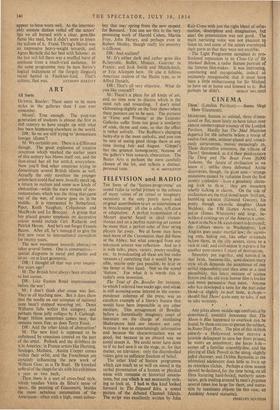TELEVISION and RADIO
THE form of the 'feature-programme' on sound radio (a verbal picture in the colours of many voices of an actual or imaginary occasion) is the only purely nova and original contribution to art or entertainment in broadcasting: all else is echo, reflection or adaptation. A perfect transmission of a Mozart quartet heard in ideal circum- stances and on a perfect receiving set cannot be ,more than a perfect echo of four string players far away. We at home may have seen more of the Coronation than did those in the Abbey, but what emerged from our television screens was reflection. And so it is with talks, plays, variety, poetry-reading, etc. In broadcasting all these are but radio versions cf something that it would be pos- sible, maybe only just possible, to hear or see better at first hand. Not so the sound 'feature.' For what it is worth this is radio's own invention.
The Trial of Dr. Bowdler for instance, to which I referred two weeks ago, and which is still arousing some interest in the corres- pondence columns of the press, was an excellent example of a literary feature that would have been impossible in any other medium. This arraignment of Bowdler before a fantastically imaginary court of literature on the charge of mutilating Shakespeare held our interest not only because it was so entertainingly informative and because the characterisation was so good, but because in an absurd way we could accept it. We could never have done so if we had seen it on the stage, or, for that matter, on television: only the disembodied voices gave us sufficient freedom of belief.
The other kind of feature programme which can reach us so well on sound is the verbal presentation of a human or physical
scene with romantic or historical associa- tions, but one which is not necessarily strik-
ing to look at. I had in this kind looked forward to The Disputed Isles, a sound picture of the debated Channel Islands. The script was excellently written by John
Keir Cross with just the right blend of infor- mation, description and imagination, but alas! the presentation was not good. The main narrating voice was not pleasant to listen to, and some of the actors overplayed their parts so that they were not credible.
• The Light Programme sustained its pro. fessional reputation in its Close-Up of Sk Michael Balcon, a radio feature portrait of the famous film-maker. It was interesting, convincing and recognisable, indeed sO intimately recognisable that it must has been a little embarrassing for Sir Michae to have sat at home and listened to it. Bu


































 Previous page
Previous page